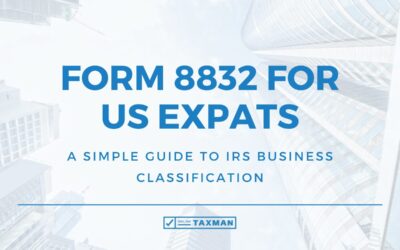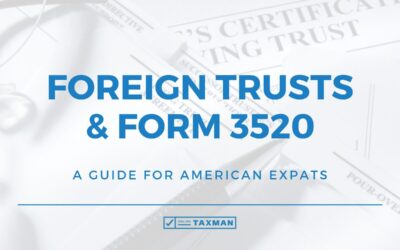The Net CFC Tested Income (NCTI) GILTI Tax - A Guide for Expats

The GILTI tax was introduced in the 2017 Tax Cuts and Jobs Act. It affects many Americans with foreign registered companies. It aims to tax intangible foreign profits, even if those earnings never return to the US. It applies when a US person owns at least 10 percent of a foreign company that is controlled by US shareholders. GILTI was intended to target US companies such as Apple that had overseas subsidiaries with profits that weren’t taxed unless the profits were repatriated. It was in fact initially known as the ‘Apple Tax’.
However, in July 2025, President Trump’s One Big Beautiful Bill Act changed the name and some of the details. Beginning with tax years starting after December 31, 2025, GILTI is now called Net CFC Tested Income (NCTI).
American entrepreneurs living abroad often have foreign corporations. Understanding NCTI is important to help prevent unexpected tax bills and improve long-term tax efficiency.
- What is GILTI / NCTI?
- What is a CFC / Controlled Foreign Corporation?
- Who pays GILTI/NCTI and how?
- The high‑tax exception
- Section 962 election
- GILTI/NCTI calculation example
- Reporting GILTI/NCTI
- Pitfalls and planning
- What to do next
- GILTI/NCTI FAQs
- GILTI/NCTI tax for expats
What is GILTI / NCTI?
GILTI stands for Global Intangible Low‑Taxed Income. It taxes your share of a foreign company’s profits that exceed a set return on tangible assets. It includes active business income along with revenue from intangible sources. Under pre-2026 rules, GILTI was calculated as aggregate net tested income of a CFC minus a 10% return on QBAI, reduced by certain interest expenses:
Net tested income of a Controlled Foreign Corporation (CFC) – (% of QBAI) + interest expense = GILTI
QBAI stands for Qualified Business Asset Investment. This is essentially the documented value of physical assets like property or machinery. If your tested income exceeds that 10 percent return on tangible asset investment, the excess becomes taxable GILTI. For tax years beginning after 2025 however, the QBAI reduction is eliminated and the inclusion equals your share of net CFC tested income (NCTI)
What is a CFC / Controlled Foreign Corporation?
A Controlled Foreign Corporation (CFC) is any non‑US company where US persons collectively own over 50 percent of voting power or value. Owning 10 percent or more makes you a US shareholder for GILTI. It does not matter whether you live in the US or abroad, just whether ownership meets these thresholds.
CFC status triggers Form 5471 reporting. Once you file this firm, you must calculate GILTI/NCTI on Form 8992. This includes any net tested income beyond your allowed return on tangible assets.
Who pays GILTI/NCTI and how?
American shareholders of CFCs are liable for GILTI/NCTI tax. For individuals, it adds to your taxable income. Or, for US corporations that own a CFC, Section 250 allows a deduction that is 50 percent through 2025 and 40 percent for tax years after 2025, lowering the effective corporate rate to 10.5 percent through 2025 and 12.6 percent starting in 2026.
For this reason, it can be advantageous to establish a US parent company for your foreign corporation.
Individuals on the other hand face normal income tax rates, up to 37 percent, unless they choose strategic elections.
The high‑tax exception
You won’t have to pay GILTI however if your CFC pays at least 90 percent of the US corporate tax rate abroad. For 2025 that means 18.9% or more. To qualify, your foreign effective tax rate must exceed that threshold. Most European countries, and Canada, have corporate tax rates that exceed 18.9%. You have to elect this exclusion annually on Form 8992.
You lose the ability to claim foreign tax credits for those earnings, though.
Section 962 election
Americans abroad with CFCs may also benefit from making a Section 962 election.
This lets you be taxed on NCTI as if you were a US corporation, enabling the 50 percent GILTI deduction and up to 80 percent foreign tax credit through 2025 and 90 percent beginning in 2026).
That means paying a 10.5% effective rate on GILTI income in 2025 (rising to 12.6% in 2026). This works best when your foreign tax rate is high but just below the GILTI exclusion threshold. You would still owe US tax on dividends later, but you reduce immediate liabilities and may gain credit room for other income. Individuals making a Section 962 election must attach a corporate foreign tax credit computation on Form 1118, and may face a second-layer tax on later distributions under Section 962.
Get in touch before choosing how you reduce your NCTI tax though, and we can advise which option will work best for you. Section 962 means corporate-style tax filings, and may trigger additional taxation upon distribution.
GILTI/NCTI calculation example
A UK CFC earned $200,000 in net income. QBAI is $20,000 (meaning $2,000 deduction), so the GILTI calculation is:
- Net tested income: $200,000
- Less QBAI return: 10 percent × QBAI = $2,000 (this won’t be available after 2025)
- Foreign taxes paid (in the UK by the CFC): $60,000
- GILTI inclusion: $138,000 ($140,000 after 2025)
As an individual taxed at 24%, the tax liability calculated in your 1040 would be $33,120 (without elections).
Adding the §78 gross‑up brings the amount subject to 21% to $98,571, which produces = $20,700 of U.S. tax before credits. Then, we calculate the deemed‑paid FTC = 80% × 98.57% × $60,000 = $47,314, which more than offsets the pre‑credit tax, so current U.S. tax is $0 under §962. Some or all distributions from the foreign corporation may be treated as taxable dividends later.
In 2026, with no QBAI deduction under the new NCTI rules: Net CFC tested income (NCTI): $140,000 (no QBAI deduction). With Section 962: 40 percent §250 deduction applies to NCTI, and the 21% corporate rate applies to the §250‑reduced NCTI plus the §78 gross‑up; in this 2026 example the amount subject to 21% is $120,000 (so pre‑credit US tax is $25,200). Then, the deemed‑paid FTC = 90% × 100% × 60,000 = $54,000, which offsets the $25,200; thus, using the §962 election, all current U.S. tax is deferred. Some or all distributions from the foreign corporation may be treated as taxable dividends later.
Reporting GILTI/NCTI
US persons with CFCs must file:
- Form 5471 to report ownership and financial data
- Form 8992 for GILTI/NCTI calculation
- Form 8993 for Section 250 deduction, if filing as a US corp
- Schedule B on Form 1040 to disclose foreign accounts/investments.
These forms should all be filed with your US federal tax return before June 15, unless you request an extension. Note though that any tax due should be paid by April 15 (at least an estimated amount). Late or incorrect forms can trigger substantial penalties.
Pitfalls and planning
Even with high-tax countries, incentives or deductions can lower effective foreign rates below the threshold and generate a US inclusion, and starting in 2026 the removal of QBAI can increase inclusions. From 2026, the Section 250 deduction is 40 percent and the deemed‑paid FTC percentage increases to 90 percent; expense allocation is simplified, which may improve credit utilization.
Having mixed income sources or operations in multiple countries complicates things further. Seek advice from an expat tax specialist, and plan for the post-2025 rule changes in the One Big Beautiful Bill Act.
What to do next
- Check whether any foreign company you own qualifies as a CFC.
- Calculate the country where the CFC is registered’s effective corporate tax rate. If it’s above 18.9 percent, consider the high‑tax exception.
- Engage a tax professional experienced with GILTI and expat tax nuances.
- We can model your numbers with and without the Section 962 election.
- File Forms 5471, 8992, and 8993 accurately and on time.
- Monitor changes: deductions, thresholds and effective rates shift over time.
GILTI/NCTI FAQs
Do I have to pay GILTI/NCTI tax if I own a foreign company?
If you own 10% or more of a controlled foreign corporation (CFC) and are a US citizen or green card holder, then yes, GILTI/NCTI likely applies. It doesn’t matter if you live overseas or where the company is incorporated. You’re taxed on your share of the company’s profits, even if you never receive them.
Can I avoid GILTI/NCTI tax if I already pay high taxes abroad?
You may be able to avoid GILTI/NCTI if your foreign company pays at least 18.9% in effective tax and you elect the high-tax exclusion. This election is made each year and depends on accurate documentation of foreign taxes. Another option is a Section 962 election, which applies corporate tax treatment and allows partial foreign tax credits.
How do I report GILTI/NCTI on my US tax return?
You report GILTI/NCTI using Form 5471 for ownership and Form 8992 for the income calculation. If you use a Section 962 election, you may also need Form 1118 for foreign tax credits. Because these forms are technical and penalties are steep, most expats seek assistance from a qualified expat tax advisor.
Does GILTI/NCTI apply to all income from my foreign business?
GILTI applies only to “net tested income” above a 10% return on tangible assets like equipment or real estate. It targets active business income but excludes some passive categories already covered under Subpart F. Not all income from a foreign business is taxed the same way under US law. Beginning in 2026 there is no 10% offset; the inclusion is your share of net CFC tested income (NCTI).
Will GILTI tax change in the future?
Yes, several changes are already scheduled, such as the name change to NCTI (Net CFC Tested Income), a higher effective tax rate and reduced deductions starting in 2026. Congress may also revisit international tax rules in the future depending on the political landscape. It’s important to reassess your structure each year to stay ahead of rule changes.
GILTI/NCTI tax for expats
GILTI/NCTI presents both a tax and a compliance burden. It often catches American expat entrepreneurs by surprise. Good planning though, with exclusion strategies or elections, may eliminate or greatly reduce your GILTI or NCTI tax.
If you haven’t been filing the forms required for GILTI, you may be able to file amended returns, or if you haven’t been filing from abroad at all, you may be able to catch up without penalties under the Streamlined Procedures program.
Remember, unexpected taxes on foreign company profits can wipe out your gains or derail expansion plans. Calculating GILTI/NCTI and filing the relevant forms is complex, so seek assistance from a US expat tax firm that specializes in helping expat entrepreneurs.
Ready to seek assistance with your US taxes?

Vincenzo Villamena, CPA
Stay Informed With The Online Taxman Newsletter
Your Title Goes Here
Text goes here






